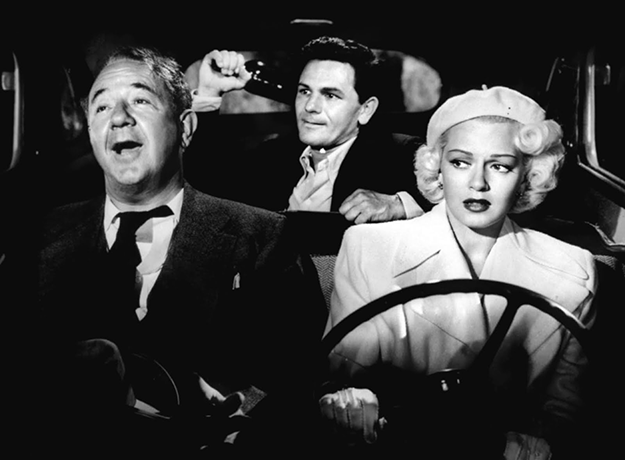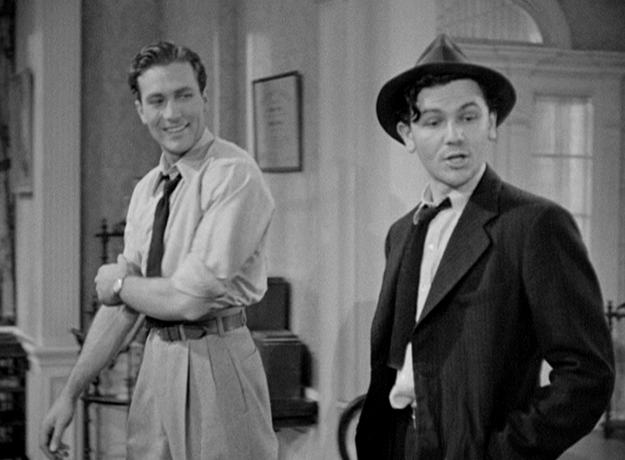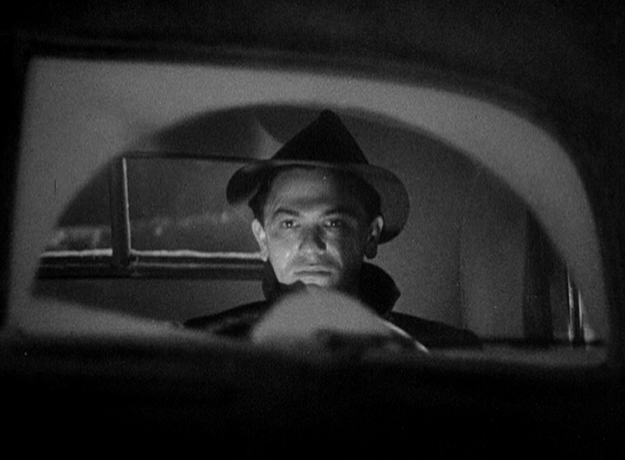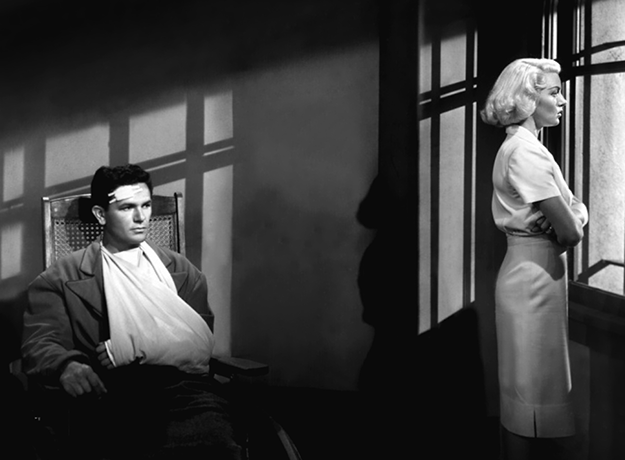TCM Diary: Becoming John Garfield

The Postman Always Rings Twice
The sign that greets John Garfield’s hard-boiled hobo at the start of The Postman Always Rings Twice portentously reads “Man Wanted.” That marker might well have met him at the studio gate in 1938 when he blew in like a gust of wind from the East. The New York-born star arrived in Hollywood at age 25, bearing the chip on his shoulder that would become his trademark, the result of a meager tenement upbringing and gang affiliation that taught him, in his own words, “all the meanness, all the toughness it’s possible for kids to acquire.”
Introduced to drama at a school for juvenile delinquents, Garfield studied acting with Russian expat Maria Ouspenskaya (best remembered as the gypsy soothsayer from The Wolf Man), an early proponent of the Stanislavskian “system” that supplied a model for Method acting. Following a term of vagrancy, he found his way into the leftist Group Theatre, where he would make a name for himself (literally, changing his given name, Jacob Julius Garfinkle) in Clifford Odets’s social drama Awake and Sing. The headstrong Garfield finally agreed to a Hollywood contract when Warner Brothers consented to allow him time off for stage work, and after a number of discarded projects they dropped him in Michael Curtiz’s Four Daughters like a bead of ink in a glass of water.
For its first 36 minutes, Curtiz’s film is a cornucopia of wholesomeness. When they’re not swinging on their garden gate, the titular Lemp sisters are accompanying their maestro father (Claude Rains) in living room concerts and nursing crushes on their new tenant, composer Felix Dietz (Jeffrey Lynn). The biggest conflict is between Felix and Mr. Lemp as to the merits of modern music. But just when the Americana is becoming as saccharine as Aunt Etta’s tea, the film plays its trump card: Mickey Borden (Garfield), a musician from New York brought in to orchestrate Felix’s composition. His “hair reaching for the ceiling, [his] tie at half-mast” as one character describes him, Mickey is a riposte to the hermetic harmony of the Lemp clan. Right away he sets about asserting the banality of the household, reducing the family members to types. (Of Etta: “the name fits right in with the curtains—domestic.”)

Four Daughters
With alternate casting this might play as comical—the streetwise city boy lampooning the Norman Rockwellian small town virtue. But Garfield makes it the opposite: call it dramatic relief. Seated at the piano, a cigarette dangling from the corner of his mouth, he manifests the pain behind his derision, the defense mechanism of mocking what he’s never known and is unlikely to have. The arrival of the youngest sister, violinist Ann (frequent Garfield co-star Priscilla Lane), gives Mickey an audience to regale with his belief in the fates and their quarter-century persecution of him. In short order we learn that he was afforded no parents, no education, and just enough talent to help others succeed. In one of many cases of actor-role simpatico, Mickey announces that he changed his name from the (more ethnic) Michael Bolgar in an effort to outrun the destinies. When Ann suggests the topic must be upsetting to him, Mickey replies that talking about his hard luck is the only fun he gets, and indeed he does seem to be enjoying himself, unloading his life story to a total stranger—or, more accurately, to the pert and sympathetic Ann, who undertakes to reform his attitudes, little comprehending the effects of kindness on one who’s never experienced it.
Garfield’s considerable skill is crucial to investing emotion in a character introduced late into a fast-moving story. Our first scene with Mickey supplies his background and worldview; our second conveys his emotional attachment to Ann, whose romance with Felix (like the gate) is in full swing; and the third, a party sequence, finds Ann and Felix announcing their engagement as Mickey silently grasps that the fates have thwarted him again. As is often the case when the camera pans across the large ensemble, Mickey is shown last, the eternal afterthought. Only in this scene there is another dissident—sister Emma (Gale Page), who carries a torch for Felix: a fact apparent solely to Mickey, who, unlike the others, is attuned to the indices of human suffering. (As he later tells Ann, “I guess when you’re used to standing on the outside you see things other people can’t.” Emma’s sorrow makes him “feel very close to her.”)
Putting aside the implausibility of Ann and Emma preferring the oatmeal-bland Felix to the charismatic Mickey (whose resignation and self-pity ebb under Ann’s ministrations), Garfield’s response to finding himself in a love quadrangle is both heart-wrenching and real. It was also like nothing Hollywood had ever presented to the public. As biographer Lawrence Swindell explains, “Garfield’s work was spontaneous, non-actory; it had abandon. He didn’t recite dialogue, he attacked it until it lost the quality of talk and took on the nature of speech.” The nearest Garfield predecessor was probably James Cagney, with his raw energy and downtown demeanor, but where Cagney projected ebullience Garfield offered something entirely new: pessimism, a sense that all is not right with the world, that people suffer and die for no good reason—as flies to wanton boys are we to the gods. His Group Theatre training, steeped in the doctrines of Stanislavsky, brought interiority to his performance, a palpable sense that he’s weighing his words, feeling the emotions in concert with Mickey. When he speaks of childhood disadvantages, it’s no great leap to imagine Garfield recalling his years as a motherless derelict on the streets of New York.

Four Daughters
When Mickey exits the story, with him go all traces of urbanness, ethnicity, and gloom, and the tale resumes its erstwhile tempo. But his impact on screen acting was irreversible. B.R. Crisler of The New York Times called Mickey “the most startling innovation in the way of a screen character in years—a fascinating fatalist, reckless and poor and unhappy . . . so eloquent of a certain dispossessed class of people.” He would receive an Academy Award nomination for Four Daughters, and in the words of his daughter Julie, “overnight the rebel as hero was born.”
Garfield continued evolving the cynical outsider paradigm throughout his short career, memorably in The Postman Always Rings Twice, a rare loan-out to MGM. Again he plays a sarcastic drifter taken in by a folksy older man and an alluring blonde, but this time it’s Nick and Cora Smith (Cecil Kellaway and Lana Turner), the genial owner of a roadside diner and his much younger wife. Garfield’s Frank Chambers is instantly smitten with Cora, who dresses head to toe in white but whose arrant ambition is anything but innocent. His voice takes on a startling edge of meanness when he confides to Cora of the tippling Nick, “I’d like to see him get plastered some night and drive off a cliff!” Entrusted to another actor, this line would speak only to Frank’s wish to remove all barriers in his conquest of Cora, but Garfield’s reading resounds with acrimony for all those who’ve had the breaks he never had: businessmen, property owners, husbands content with their lot.
The same violence pervades his voice when he orders Cora to kiss him before he socks her. Indeed, Postman is a film about compulsion: Frank and Cora, despite their combustible attraction, spend most of the film despising and mistrusting one another. Frank has ample opportunity to leave her, before and after they engineer Nick’s cliffside demise, but he always returns; they’re “chained to each other.” And his disruptive presence here is a bead of ink in a bucket of tar. Frank’s desperate act, motivated by lust and envy, is nothing compared with the blackmail and lawyerly double-crosses he encounters in the film’s second half—or the possibility that Cora wants him dead, too.

The Postman Always Rings Twice
At the end of 1946, the year of Postman’s release, his contract with Warner’s expired and he struck out on his own, making uncompromising films about personal integrity (Body and Soul, Force of Evil) until his own progressive politics and tight-lipped code of honor ran afoul of the House Committee on Un-American Activities. Method-trained stage actors Montgomery Clift and Marlon Brando would extend his legacy of sensitive, troublemaking characters, but perhaps never in such stark contrast with their frameworks as was the case for Garfield and the torrent of chaos he unleashed against an unsuspecting prewar world. Garfield might have been channeling Mickey of Four Daughters when he scoffed, “No actor can be really good until he’s reached 40.” The fates wouldn’t allow it. The postman rang for John Garfield at age 39.
The Postman Always Rings Twice airs September 24 on Turner Classic Movies.
Steven Mears received his MA in film from Columbia University, where he wrote a thesis on depictions of old age in American cinema.







